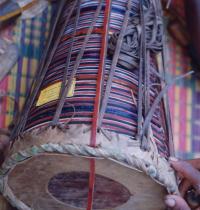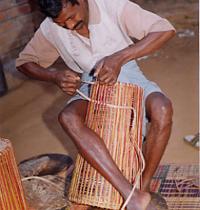Jayasri Banerjee
Grant Period: Over one year and six months
Jayasri Banerjee is an independent researcher working on folk and tribal performance genres of the Junglemahal. She is a musicologist and educationist by profession. Musicologist Dr Jayasri Banerjee will study and document the musical traditions of the Adivasi communities of Junglemahal in West Bengal. These communities have traditionally understood their environment and music to be intimately related to their everyday existence and worldview and, therefore, integral to their identity.
She proposes to study and document the threatened musical traditions of the Adivasi community of Junglemahal in West Bengal. A musicologist and educationist by profession, she argues that Adivasi music cannot be treated as an independent art form with its own rules, grammar, aesthetic norms, and values. Music is closely related to their everyday existence and holistic worldview and, therefore, integral to their identity. The Adivasi attach important symbolic meaning and values to their music and musical instruments.
Once closely linked to ritual, the instruments and indeed the music itself are under immediate threat. Rampant deforestation in the area, single species planting and unsympathetic laws governing use of forest reserves, ensures that the community is deprived of certain kinds of wood and bamboo from which the instruments are made.
Banerjee has been closely involved with programmes conducted in the region under the aegis of the National Literacy Mission. With literacy campaigns, however, the master-apprenticeship system invariably dies, and with it the space to retain, retrieve or transmit traditional musical skills. Instead of encouraging the Adivasi to make and use their own musical instruments, the government distributes harmoniums, tablas, and kettledrums.
Traditional musical instruments of the Adivasi are an important focal point for the research supported by this grant. Among these Banerjee lists for close study, the ‘jhanjh’, a form of cymbal; a variety of drums like the 'dhol', 'bada dhol', 'madal', 'nagra', 'huki' and 'dhamsa'; the chordal instrument, 'banam'; and two kinds of flutes.
Banerjee expects to produce a scholarly study documenting myths, legends and other relevant narratives necessary to an understanding of the symbolic underpinnings of the traditional music of Junglemahal. The outcome of the study, she feels, may benefit the Adivasi in multiple ways.
Banerjee also plans to develop resource materials for use in the Individual Interest Promotion Programme of the ongoing National Literacy Mission. With the active support of the district literacy committees, copies of the material will be distributed to libraries at the village literacy centres. Banerjee will also organize workshops and training programmes to sensitize personnel working in literacy programmes to local musical and other cultural traditions.


